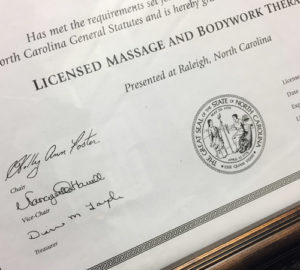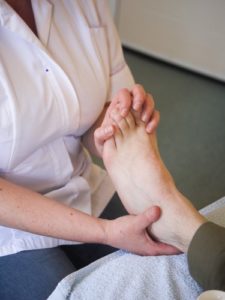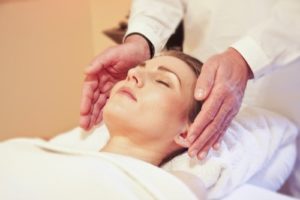How do you find a legitimate, Licensed Massage Therapist (LMT) or Licensed Massage & Bodywork Therapist (LMBT) in the US?
In most states, massage therapists are required to attend massage school for a very specific number of hours designated by the Board of Massage that oversees them in each state. Wyoming, Kansas and Minnesota are not licensed but there may be specific city/county requirements. California has voluntary certification.
Look for a license number. All massage therapists in states that require licensing are issued a license number and many states require that it be placed on advertisements and the actual license may be required to be posted in the office. Each state will have a license look up that you can use too. The databases are linked here in this search from the Federation of State Massage Boards website.

How Do You Find a Professional Reflexologist?
Reflexology is the practice of massage that focuses on the feet and hands and is based on the traditional idea that specific areas in the hands and feet will correlate with varioust parts of the body. Put pressure on the big toe and it will relieve headaches… pressure on the ball of the foot will help upper back pain and so on.

Many states have actually created separate laws regarding the practice of reflexology. Often the laws leave loop holes that then allow unlicensed (and often unskilled) people to open businesses where they use the concept of foot massage to disguise the business as a brothel. This loophole makes it easy for traffickers to use this modality as a front for their criminal activity.
There are professional associations guiding the practice of reflexology, which all have standards for professional members. Reflexology Association of America (RAA) have requirements for their membership. All association members must have completed a reflexology-only course of at least 300 hours, with at least 160 of those hours completed live in a classroom, which must be provided via documentation to the associations with the membership applications.
The American Reflexology Certification Board (ARCB) provides the designation of National Board Certified Reflexologist (NBCR), which can be obtained by successfully passing a 300-questionexam, submitting documents proving performance of 90 treatment sessions, and completing a hands-on practical exam. Those holding this title must also complete 24 hours of approved continuing education biennially.
Some professionals choose to designate their status by using post nominal letters after their names. Those designations are CR (Certified Reflexologist) and NBCR (Nationally Board Certified Reflexologist)
You can search for professional members in your area using these links:
Reflexology Association of America
American Reflexology Certification Board
What About Other Types of Energy Work?

Traditional Eastern Medicine operates under the premise that the human body has energetic pathways running throughout it. Energy Work is a blanket term for any therapy that creates subtle changes in our energy field, which extends beyond the body, guiding recipients to regain balance and heal their bodies. Often based in ancient healing traditions, energy work generally focuses on improving emotional and spiritual health, which affects our physical well-being. These modalities can include Reiki, Reflexology, Polarity Craniosacral, Kinesiology, Acupuncture, Acupressure, Chakra Balancing, Qi Gong, Vibrational Healing, Color Healing, Tamtric Masage and more. Generally, the energy is channeled to the receiver through the practitioner, removing blocks to a healthy energy flow within the body. A practitioner’s own energy can be part of the inputs to the client, and, based on their training and tools used.
Because many of these modalities are new to people in the United Sates, it can be challenging finding trained professionals when you are looking for alternative methods of healing. From what we can find, there are no agencies regulating most forms of energy work. While there are professional organizations that provide training, most of these modalities are not controlled or regulated by state or federal government. Additionally, most associations related to energy work do not require education to be a member, although most provide insurance for some modalities and a code of conduct for members use of the site. Unfortunately, this leaves the public in a vulnerable position when seeking a trustworthy provider.
The Energy Medicine Professional Association, which requires an education certificate to become insured with them, has a practitioner directory which can provide some guidance on finding a reputable practitioner.
The International Energetic Healing Association is made up of practitioners, businesses, students, and community members with a practitioner search page. Note: from what we can tell, they do not have a professional requirement.
The Healing Touch Professional Association provides information on its’ practitioners, as well as a thorough list of organizations that support energy workers.
Any good practitioner should be more than happy to provide you with information about their practice and their business. Your well-being should be of the utmost importance!
When searching for the practitioners and tools that best work for you, follow these guidelines:
- Get a referral from a friend, family member, or health professional you know and trust.
- Ask for and verify practitioner’s education, experience, and licensure, if applicable.
- Look for an online presence. Is there a website? Do they have any connections to any professional groups, the chamber of commerce, or any other local organization?
- Search the internet for the business and practitioner’s names and see what comes up.
Why is this necessary?
Since the late 1800’s, massage therapy has often been confused with sex workers making finding a massage therapist confusing at times. This has had a great impact on the massage profession. The Federation of Massage State Boards Human Trafficking Task Force Report (2017) Report states that:
• It endangers therapists. In addition to all of the dangers inherent in human trafficking, the association of massage therapy with prostitution or “happy endings” subjects therapists to assault, threats, harassment, and more subtle forms of intimidation;
• The cost of doing business rises due to increased exposure to safety risks and security hazards;
• Compromised reputations:Regulatory board responses may be viewed as inadequate or ineffective due to public perceptions of the nature and scope of the problem;Smaller massage establishments may suffer disproportionately. Larger massage franchise brands may be perceived as less likely to be involved in illicit activity;The presumption of illicit activity is prevalent and negatively affects bona fide professionals, schools and establishments;
• It encourages racial and ethnic profiling, as well as discrimination against certain groups;
• A substantial amount of fraud directed at massage therapy educational institutions, testing authorities, and state licensing boards is a problem that casts uncertainty on their ability to limit entry to qualified candidates;
• The necessity (and burden) of additional regulation and safety protections, such as: Increased application fees funding interventions to detect and prevent fraud and to support investigations and prosecutions of human trafficking; The high cost of ensuring that adequate security measures are in place for examinations to prevent cheating and item harvesting and to support legal action;Multiple and overlapping regulatory requirements (local and state, professional and establishment);Establishment licensing requirements.
A Masters Track Athlete who gets regular weekly massage in WA State where massage is widely accepted as healthcare, travels to NYC where sex workers disguising their business as massage are all around and makes an appointment at a SOB and gets his massage but is asked if he wants a happy ending.
A person makes an appointment at a SOB for a foot massage receives the foot massage and is asked if they want to go in the back room for more.
A massage therapist applies for a position at a local spa and gets hired and is then asked to perform sexual services. The massage therapist makes a complaint to the attorney general and the spa is investigated and the owner prosecuted for human trafficking.

